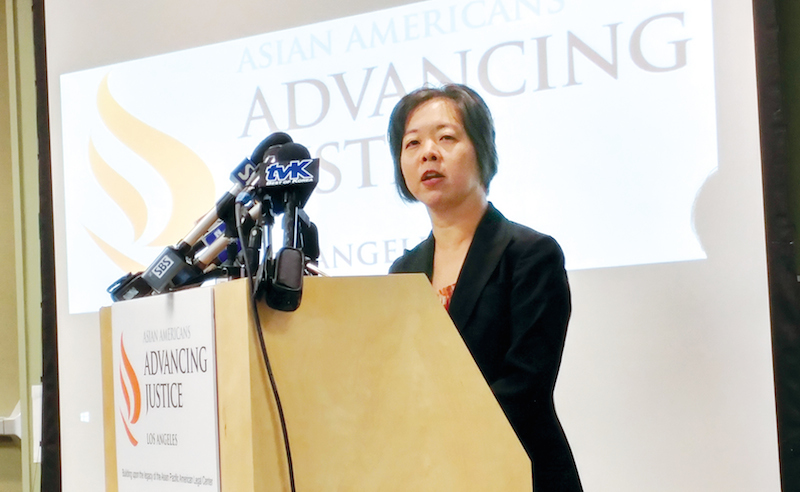
As election day is quickly approaching, activists and leaders have been encouraging members of the Asian American Pacific Islander community to get out the vote.
During the last national elections in 2012, some 47.9 percent of eligible Asian American voters actually voted, according to the U.S. Census Bureau's data on voters who are ethnically Asian alone and Asian with other race combination.

Karin Wang, the vice president of programs and communications at Asian Americans Advancing Justice - Los Angeles, spoke at the press conference that took place at the AAAJ-LA office on October 13.
"We estimate that more than 1.6 million AAPI individuals will vote, which is about 11 percent of the electorate," Karin Wang, the vice president of programs and communications at Asian Americans Advancing Justice Los Angeles (AAAJ), said regarding the upcoming elections.
Organizers and civic leaders have pointed to a disillusionment towards or frustration with this year's candidates on the presidential ballot as a possible reason that Asian Americans may choose not to vote. In response, they're taking different approaches to encourage members of the ethnic group to vote.
Wang, for instance, said she encourages eligible voters to get out the vote because "the reality is that there's much more [than the President] that will be decided on."
Voters in California will vote on 17 state ballot measures, and voters in Los Angeles will also vote on seven county, city, and community college district measures. Among them include state propositions to increase taxes on cigarettes to two dollars per pack (Proposition 56); repeal most of a previously passed proposition which required education in English only, which would now allow school districts to use any educational approach to teach English learners, including bilingual programs (Proposition 58); and legalize recreational marijuana for adults 21 years old or older (Proposition 64). Local measures include one that proposes to institute a parcel tax to continue securing funding for existing and new parks before current funding runs out (Measure A), and another that would increase sales tax in the county to invest in "traffic improvement' projects including subway lines, bike paths, streets, and sidewalks (Measure M).
"State and local ballot measures will have more of an impact on our daily lives," said Wang.
Meanwhile, David Ryu, Los Angeles City Councilmember of the 4th District, said that the national ticket actually serves as a "clear reminder of our need for greater understanding and representation of minorities in every aspect of our society."
"While this election cycle is more important than ever, too many Americans still take their right to vote for granted," he said. "But for me and many Asian Americans, this election is too personal not to vote."
In recent weeks, Asian American non-profits in the greater Los Angeles area have held numerous events and drives to encourage voter turnout. Asian Americans Advancing Justice and the Asian Pacific Policy & planning Council (AP3CON) hosted a press conference on October 13 during which representatives from various Asian American non-profits shared their stances on local and state ballot measures. In late September, voter registration drives were held across Los Angeles by a joint effort of Korean American organizations including the Korean American Coalition and the Koreatown Immigrant Worker's Alliance.
The Korean Resource Center (KRC), based in the Crenshaw area of Los Angeles, will also be holding a phone drive on October 17 to call eligible Asian voters.
"Voting shows that our community has a voice, and that our voice matters," said Aquilina Soriano-Versoza, the executive director of the Pilipino Workers Center. "That the Asian American vote matters."



















